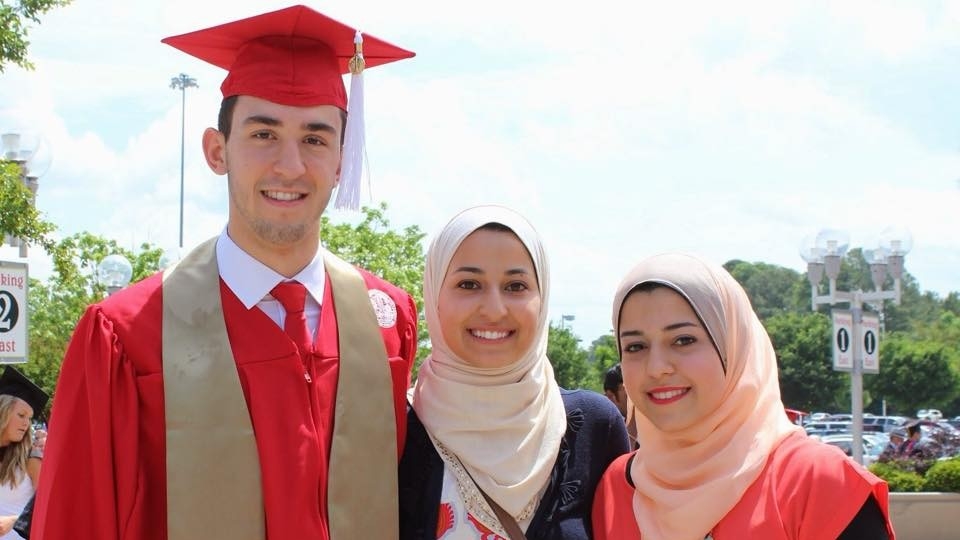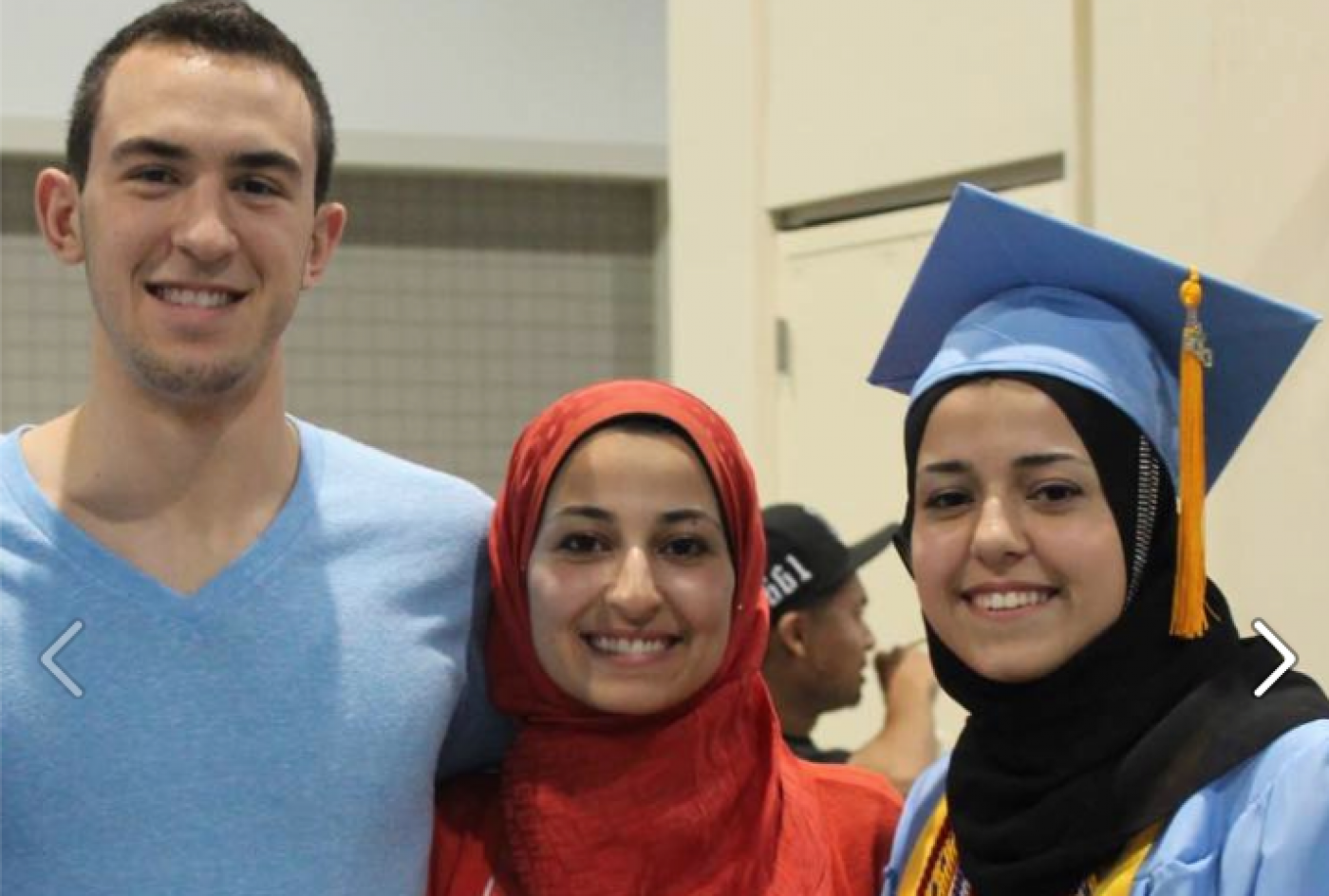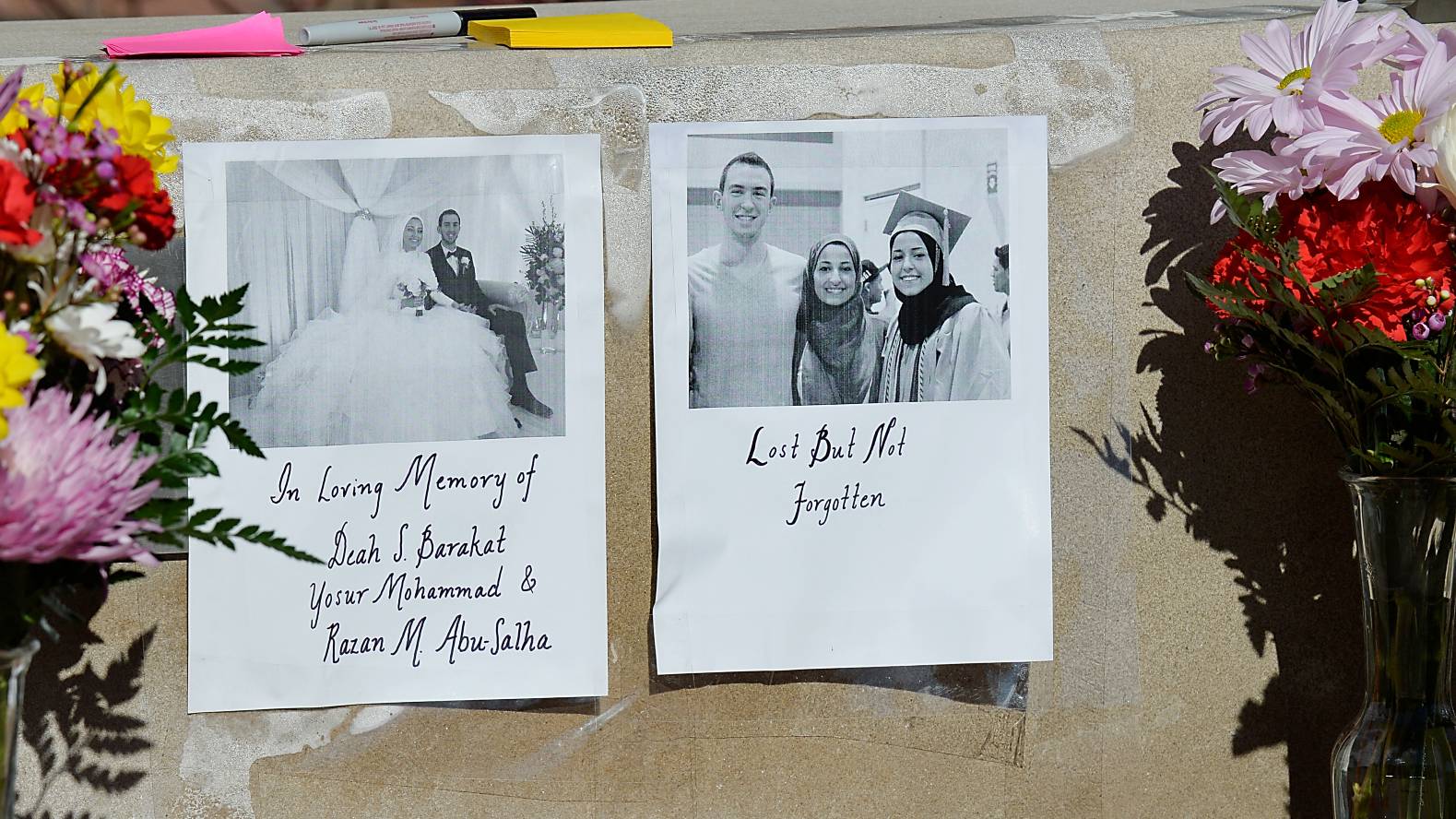Chapel Hill shooting anniversary: Muslim community continues healing process

Lela Ali remembers the tragedy like it was yesterday.
She was studying inside the library at North Carolina State University with fellow Muslim students when the news emerged that Deah Shaddy Barakat, 23, Yusor Mohammad Abu-Salha, 21, and her sister Razan Mohammad Abu-Salha, 19, were murdered at their home in Chapel Hill, North Carolina.
'People are still healing from it. I don't really think that it gets better with time'
- Lela Ali, Muslim Women For
"It really shattered our community in many different ways. And it really impacted and touched every single person from the youngest of us to the oldest of us in very different ways."
"That entire week following the killing of Deah, Yusor, and Razan, I slept home every night that week. And I was someone who lived on campus, but I was terrified. I couldn't sleep alone," Ali told Middle East Eye.
On the seventh anniversary of their deaths, the Muslim community of North Carolina is still picking up the pieces and working to deal with the pain. But no matter how much time passes, the wounds never seem to fully heal.
New MEE newsletter: Jerusalem Dispatch
Sign up to get the latest insights and analysis on Israel-Palestine, alongside Turkey Unpacked and other MEE newsletters
"It took a long time for people to really cope with what was going on and I think till now, people are still healing from it. I don't really think that it gets better with time," Ali said.
On 10 February 2015, Barakat and the Abu-Salha sisters were fatally shot by 46-year-old Craig Hicks, in what police had labelled a parking dispute. But for many in the Muslim community, it was viewed as a hate crime.
Deah and Yusor had been married for a year and were dental students at the University of North Carolina, while Yusor's younger sister Razan was studying architecture at North Carolina State University.
Hicks was found guilty and given a life sentence in prison. But to this day, police have ruled out the killings as hate crimes, though many in the community say the three were attacked because they identified as Muslims.
Many continue to have lingering fears a similar attack could take place, in part because of the lack of recognition that the murders were due to anti-Muslim sentiment.
"I think that a lot of us very well believe that this could happen again," Ali said.
"That fear never really goes away. But I think what makes it a little bit easier to navigate is this aspect of building community and envisioning together collectively what safety looks like."
'Share the light they spread'
Every year, as the anniversary approaches, a sombre mood is palpable in the community. While the tragic incident has been out of the headlines for years and the rest of the country has moved on, each February brings back the distressful emotions felt by everyone on that night.
Joshua Salaam, a Muslim chaplain at nearby Duke University, said the anniversary is a good time to reflect on the remaining wounds, as they can often be difficult to process alongside all of the other tragedies and killings that have happened across the country.
'The main thing that the family and the community wants everyone to remember is how they lived their lives, rather than the fact that they're gone'
- Nadia Khan, Light House Project
"There's so much happening in the world that it's hard to remember tragedy. We have mass shootings so often in America. We have murders so often in America, kidnappings, rapes, torture, so often in America."
"When it comes to the news, it captures the society for a little bit. And then something else happens, you have Ahmaud Arbery or you have George Floyd. It's hard to remember all of the pain and all of the suffering. And so when do you bring these things back up? Salaam said.
"I think we all kind of need some guidance so that we don't forget the past because it informs the future. At the same time, it's important to be mindful of the pain that is experienced from reliving and being reminded of traumatic events."
For Ali and others, rather than dwelling on the tragedy, the anniversary serves as an occasion to celebrate the victims' lives and how they lived.
"The main thing that the family and the community wants everyone to remember is how they lived their lives, rather than the fact that they're gone. They want to share the light that they spread, the service that they did, and to continue their legacy," said Nadia Khan, executive director of the Light House Project, a community service organisation founded in honour of the three victims.
During the month of February, they host food drives and social media campaigns in their honour, while the Light House Project, which has found its base in Deah's former home, is now fulfilling his lifelong wish: it has become a space where young members can have the resources to pursue their passions in life.
"In his last tweet, Deah shared his vision for a space for young Muslims and to support them in their projects and to give them a voice. And that's the mission of the Light House Project, to empower Muslim youth," Khan said.
'Only partial justice'
Grief is a complex experience and it is filled with many emotions, including anger and frustration. And for many of those close to Deah, Yusor and Razan, there was always a feeling that justice was never fully achieved.
Muad Hrezi and Nida Allam, friends of the victims, decided to turn to politics for this pursuit of justice and desire to protect their communities.
Allam went on to become the first Muslim woman to be elected to public office in North Carolina and became Durham County Commissioner in 2020. After launching a successful political career, she is now running for Congress in North Carolina.
Hrezi headed to the halls of Congress to become a senate staffer and is now also running for a seat in Congress in Connecticut.
“The murder of Deah Barakat and Yusor and Razan Abu-Salha was life-shattering. Deah was a friend and I had the opportunity to meet Yusor, his newlywed wife, once," Hrezi told MEE.
“In the heartbreak, I found a renewed purpose: to get involved in politics because the lies and smears that were being spewed were literally killing us. The conviction of Craig Hicks provided only partial justice. His horrific crime was never labelled a hate crime, even though it was abundantly clear that it was.”
And for Ali, the lives of Deah, Yusor and Razan inspired her to start her own organisation, Muslim Women For, a local grassroots political initiative.
"It became necessary that we start creating spaces where we centre people in our community that are most at risk and may face the most vulnerabilities and work to be able to protect them," Ali said.
Middle East Eye delivers independent and unrivalled coverage and analysis of the Middle East, North Africa and beyond. To learn more about republishing this content and the associated fees, please fill out this form. More about MEE can be found here.







